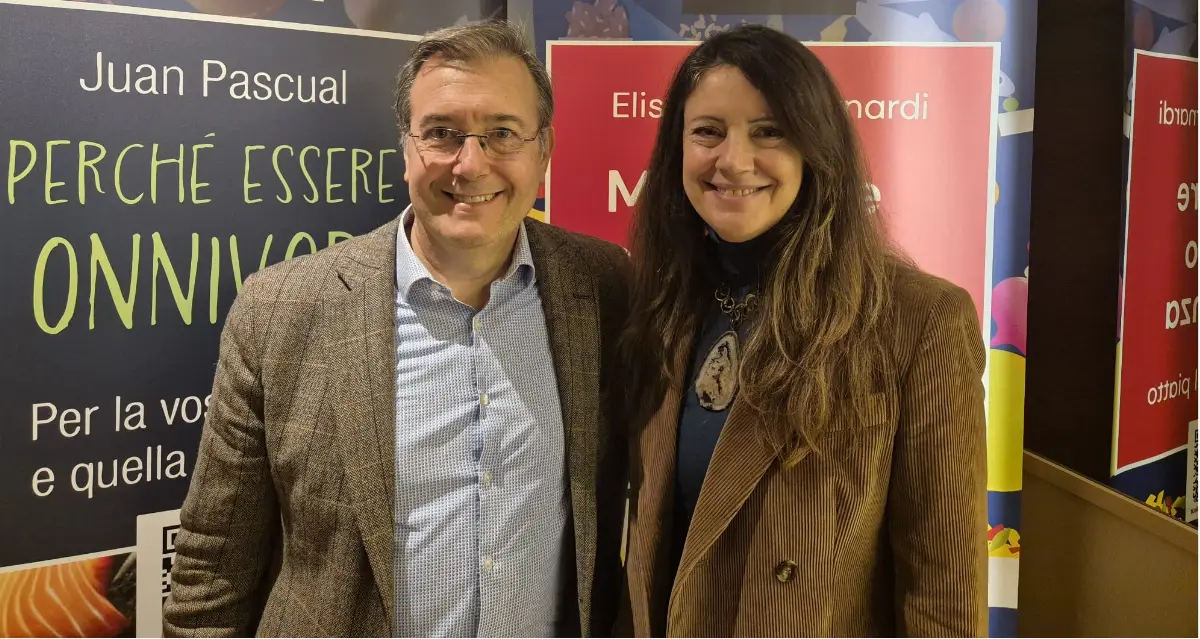
Meat and farming essential for the future of humanity
The issue was discussed in a round table in Rome, with a focus on the usefulness of the Mediterranean diet

For the occasion, the latest books by Juan Pascual and Elisabetta Bernardi were presented.
Diets and animal production, ethical, environmental and health implications. This is the theme of the meeting "Eating according to nature: science confirms that we are omnivores", which took place in Rome. The protagonists of the event were the Spanish veterinarian and science communicator Juan Pascual , author of the book "Why be omnivores" (Edizioni Lswr, 2024) and Elisabetta Bernardi , biologist, nutritionist, professor of nutritional biology at the University of Bari and author of the book "Eating according to science" (Edizioni Dedalo, 2024).
Pascual explained why animal products are important: "There is no doubt that everyone should freely choose how to live and what to eat, however when it comes to healthy nutrition we must avoid arbitrary solutions" based on prejudices, ideologies or emotions. "It must be science, and not the beliefs of some organizations, that defines what determines well-being or not." Furthermore, according to a study published in Psychology Today, among people who embrace the vegetarian and vegan lifestyle worldwide, 84% abandon it for reasons such as difficulty in implementing the diet or, more frequently, deterioration of health. In Italy, according to the latest Eurispes data, 93.4% of the population is omnivorous.
As Elisabetta Bernardi explained, "too much limitation or overdoing a nutrient can optimize or hinder certain processes. Many of our predispositions are written in our DNA, however there is a sort of switch that turns a gene, a characteristic, a predisposition on or off and lifestyles, the environment in which we live and what we eat play a fundamental role. Poor nutrition, in fact, can lead to a reduction in our immune response, increasing susceptibility to disease and compromising physical and mental development. Not to mention the concrete risks that a low-protein diet can cause. When the body needs proteins or amino acids and does not receive enough from the diet, it can begin to degrade muscle proteins to obtain the necessary amino acids (the heart is also a muscle). This process is called protein catabolism and is one of the reasons why a low-protein diet can lead to loss of muscle mass, compromising strength, physical function and basal metabolism."
Farming, then, fits right into the circular economy and "animals transform what we are not able to transform" Pascual stated, "vegetable waste that for us has no value, but which they convert into proteins of high biological value".
Being omnivorous is therefore also a resource for the planet, animals become a fundamental part of this ecosystem, helping us to limit waste. What would happen, then, if we all became vegan? "A total environmental, health and nutritional catastrophe", confirmed the Spanish scholar.
During the debate, it was highlighted that malnutrition continues to be one of the plagues of humanity. According to FAO, in fact, over 733 million people, more than 1 in 10 worldwide, suffer from severe malnutrition and up to 2 billion people have difficulty regularly taking in all the necessary nutrients. And the situation worsens at pediatric level: among children under 2 years of age, only a third receive the adequate amount of food. The World Health Organization recommends that children of this age consume meat and eggs daily because they are rich in iron and zinc. However, only 1 in 3 children consume meat or fish daily and only 1 in 5 has access to eggs.
Another topic addressed during the debate was that of animal pharmacopoeia: without animals we would be forced to do without some drugs, even if they save the lives of millions of people every year. The most emblematic case is that of heparin, a natural compound found in the mucous membranes of some animals (swine and cattle), used in the treatment of circulatory diseases such as thrombosis.
Last but not least: the never-ending validity of the Mediterranean diet. In this regard, a recent US study published in "Nature" was cited, which confirms the presence of dietary trans-vaccenic acid in beef and sheep meat, as well as in milk and cheese: this substance is the most effective in promoting anti-tumor immunity. "The results of this study", Bernardi underlined, "reaffirm the importance of a complete diet of all foods such as the Mediterranean diet because what we eat influences our health and it would be a shame to deprive ourselves of some foods, perhaps due to mistaken beliefs".
EFA News - European Food Agency